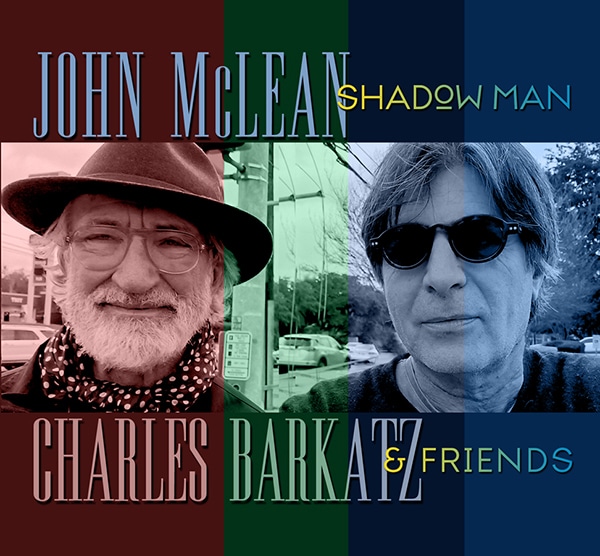
Rays of culture, artistic proficiency, open-mindedness, and long experience converge in these 10 songs, causing “Shadow Man” to dance, pulse and explode in showers of blues and other hues. John McLean, Charles Barkatz, and their guests, have created a blues album unlike any other, to cap off a year absolutely unlike any other.
John McLean was born in New York City, but raised on a ranch outside Dallas, Texas. He’s produced off-Broadway theater, played flute and bagpipes at the Met, and led jazz bands in Paris. The sprightly 80 year-old that he is, he’s begun a new leg of his journey now as a songwriter and singer of the blues. Meanwhile, Charles Barkatz began his musical trip playing classical guitar as a pre-teen in Paris in the early 1970s, but quickly fell under the spells of Americans Muddy Waters, Jimi Hendrix and Wes Montgomery. His technique balances silkiness with a dirty side, enabling him to be comfortable playing guitar in just about any situation.
“Shadow Man” thrives on its situations, which vary considerably. “Leaky Shoes Blues” begins the album on a jolt of male voices chanting “Gotta get out,” before McLean picks up the narrative, diving straight into a sweet and funky rhythm and blues groove pumped with horns and featuring a cornet solo that identifies with the Parisian locale the lyrics reference. When McLean sings “I’ve seen this film before, and I’d leave right now if I could,” it’s in a voice of high anxiety cut with wisdom, like a thrown-back shot and a spilled beer. At times, he recalls fellow octogenarian John Mayall in timbre.
Listening to McLean’s voice crack with emotion at a particularly low point in the lowdown “She Cry Blues” is startling, his performance so real to life. A biting guitar solo by Austin great Derek O’Brien only enhances that sensation. And therein lies another key to “Shadow Man’s” success and appeal. O’Brien was handpicked for the core band by the producer, Texas Horns leader Mark “Kaz” Kazanoff, who was asked by McLean to take the job. McLean wanted the best in Texas blues as a basis for the album’s songs, and O’Brien, keyboardist Nick Connolly, bassist Chris Maresh, and drummer John Chipman lend a robust, interconnecting backbone throughout. Add in the Texas Horns, and the sound is roadhouse-ready, nightclub-smoky, or café-elegant, depending on the needs of the song.
Guest harpist Elaine Barber adds much to the dreamy qualities in “Lucia” and “Lac D’argent,” love songs both—for a lady, and a lake. As she hugs and caresses her instrument, a Latin zest rises from the former, and a Parisian fragrance from the latter. Barkatz plays along with her subtly but exquisitely, pulling on and sweeping across his own strings like the master he is. Otherwise, “Shadow Man” conjures a hand-clapping, 1960s beatnik celebration, and “Sister of Mine” recalls JJ Cale, as if he were sitting on a bench in Champ de Mars with guest flautist Alex Coke puffing along with him. “Black Train” then summons the pitch dark, and the spookiness of twin rails running along the edge of a Southern swamp, Kazanoff emulating the sound of an approaching train on his harmonica.
Music certainly is the universal language, and John McLean and Charles Barkatz have employed it well to highlight both exploration, and unity.
–Tom Clarke
- John McLean and Charles Barkatz & Friends
- ‘Shadow Man’
- Label: TreeTops Records
- Release: Dec. 4, 2020

